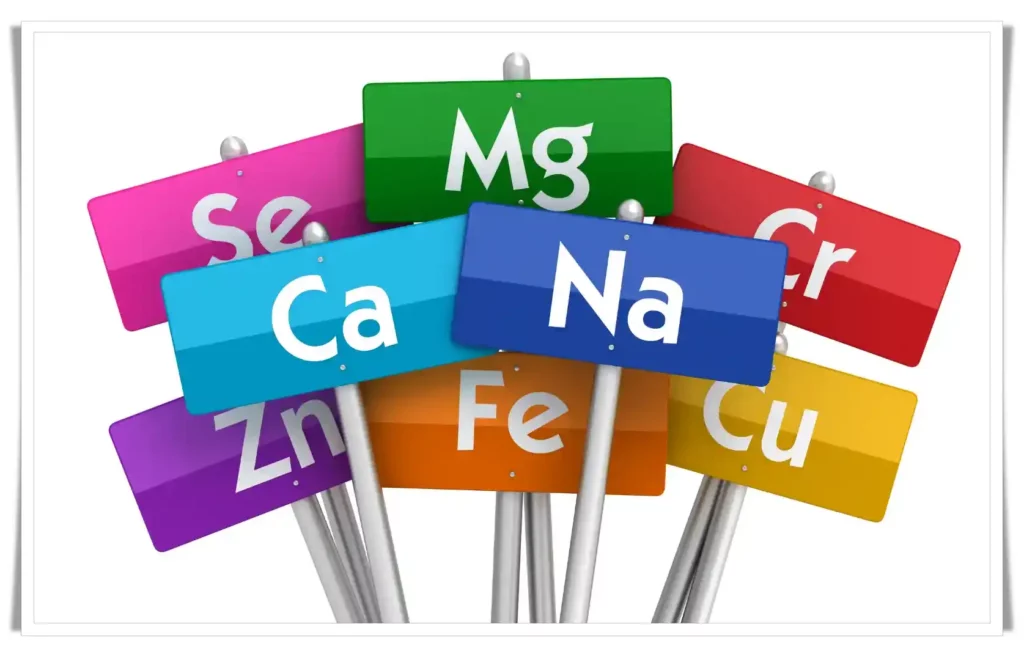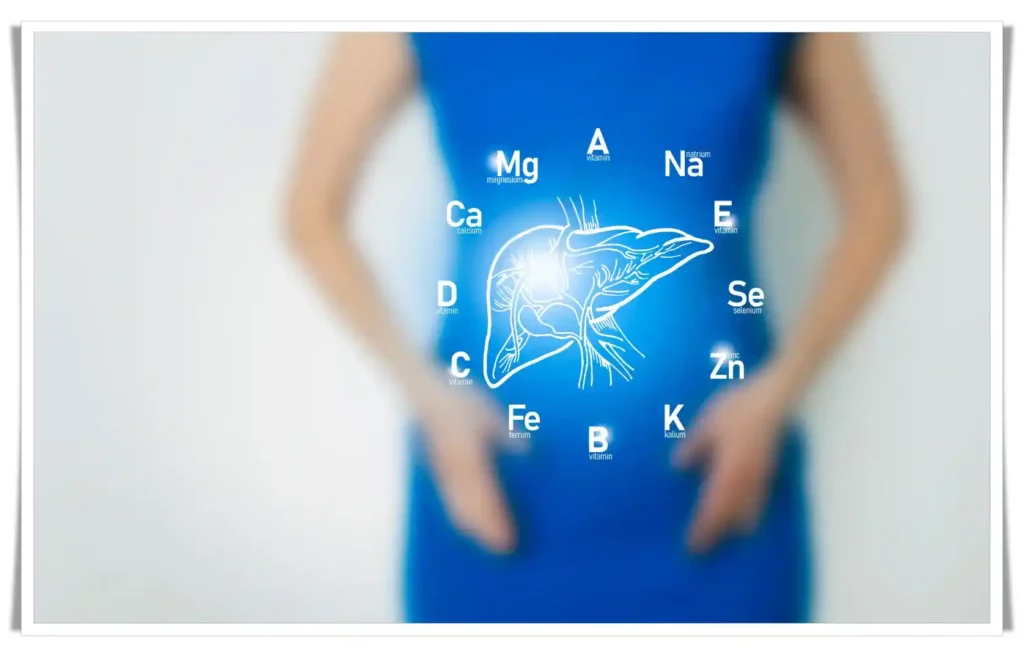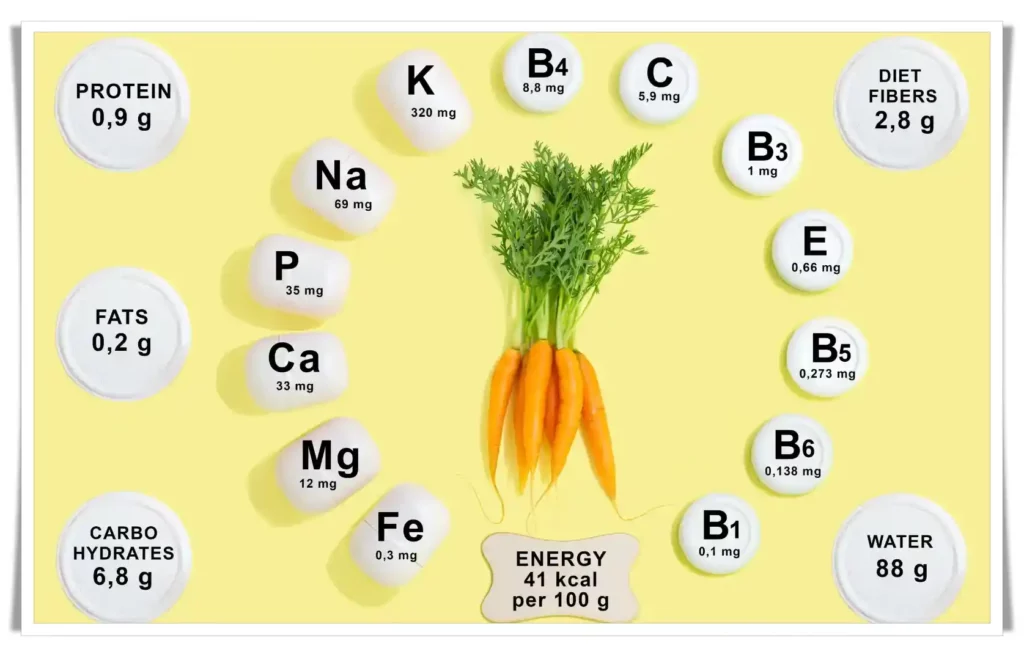Introduction
Often, we wonder, "What are the most important minerals and vitamins that our body needs in order to function optimally? In the absence of these, what malfunctions can occur?" The truth is, minerals and vitamins play crucial roles in our health, and their deficiency can lead to a host of problems. To maintain a healthy body, it's essential to understand these vital nutrients and where they are found in their pure natural state.
Empower Your Health Journey – Explore My Free Apps for a Vibrant, Healthier Lifestyle Today!
Why are Minerals and Vitamins Important for the Body?
Minerals and vitamins, the micronutrients that our bodies require in smaller but consistent amounts, are undeniably the unsung heroes of our well-being. They play a central role in maintaining our overall health, from the strength of our bones to the function of our immune system.
One of the vital roles of minerals and vitamins is facilitating the healing process in our bodies. They contribute to the repair and growth of tissues, aiding in the quick healing of wounds and injuries. For example, vitamin C is instrumental in the production of collagen, a protein that plays a key role in skin health and wound healing. Minerals like zinc and iron also play crucial roles in healing, supporting cell growth and improving immune response.

These essential nutrients also act as the main line of defence for our immune system. Vitamins such as A, C, D, and E, and minerals like zinc and selenium, are integral in fortifying our immune response. They work together to protect our bodies from harmful pathogens, reducing our risk of falling ill and speeding up recovery when we do.
Another crucial function of minerals and vitamins is energy production. They are deeply involved in the metabolic processes that convert the food we eat into usable energy. For instance, B vitamins are essential in converting carbohydrates into glucose, which our bodies use for energy. Similarly, minerals like magnesium and phosphorus play a significant role in energy production and storage.
Furthermore, these important minerals and vitamins assist in repairing and mitigating cellular damage. Antioxidant vitamins like C and E protect our cells from damage caused by free radicals, unstable molecules that can harm cellular structures. This cellular protection is critical in preventing various health problems, including ageing-related disorders and conditions linked to oxidative stress, such as heart disease and cancer.
The importance of minerals and vitamins goes beyond these key functions. They are involved in several other physiological processes, including nerve transmission, hormone synthesis, and maintaining heart rhythm. They contribute to the proper functioning of virtually all organ systems in our bodies.
Without a sufficient and regular intake of these essential minerals and vitamins, our bodies could be at risk of chronic diseases and poor health outcomes. Deficiencies can lead to a range of health issues, from minor symptoms like fatigue and hair loss to severe conditions like osteoporosis and scurvy. Hence, it is vital to ensure that our diets are rich in these essential nutrients to maintain optimal health and well-being.
Essential Minerals and their Role in the Body
Minerals are vital, inorganic substances that our bodies cannot produce on their own, but need in modest amounts to perform a wide range of physiological functions. From contributing to the structure of our bodies to enabling the function of our hearts, brains, and muscles, minerals are undeniably essential to our health and survival. Let's delve deeper into some important minerals and their critical roles:

- Calcium: Widely known for its crucial role in maintaining bone health, calcium is the most abundant mineral in our bodies. It forms the structural component of bones and teeth, giving them strength and rigidity. However, calcium's role extends beyond that. It also plays a critical part in blood clotting, ensuring that wounds heal properly by stopping excessive bleeding. Moreover, calcium is necessary for the proper functioning of our nerves and muscles. It aids in transmitting signals in nerve cells and helps muscles, including those in our heart, contract and relax properly.
- Iron: Iron stands out as an essential element in our bodies due to its critical role in the formation of haemoglobin, a protein in red blood cells that transports oxygen from our lungs to the rest of the body. It helps our bodies create energy from nutrients, aiding metabolic processes that convert food into energy. Besides, iron contributes to the transmission of nerve impulses, the signals coordinating the actions between different parts of the body, thereby supporting overall body coordination and function.
- Magnesium: This vital mineral is involved in over 300 enzymatic reactions in the body, emphasizing its broad importance to our health. Magnesium is key to many body processes, including regulating muscle and nerve function, making it important for heart health and nerve signal transmission. It also maintains blood sugar levels, helping to manage and prevent diabetes. Additionally, it contributes to the production of protein, bone, and DNA, thus playing a significant role in genetic functions, bone health, and bodily growth and repair.
- Zinc: Zinc is an indispensable mineral that plays a central role in immune function. It is necessary for the immune system to fight off invading bacteria and viruses, thereby helping us stay healthy. Moreover, zinc is involved in protein synthesis and DNA creation, the genetic blueprint within all cells. It's fundamental for growth, healing, and reproduction, and it also supports our sense of taste and smell.
Understanding these essential minerals and their roles in the body allows us to appreciate their significance in maintaining our overall health and well-being. It also highlights the importance of consuming a balanced diet rich in these minerals to ensure the optimal functioning of our bodies.
Vital Vitamins and Their Significance
Vitamins, much like minerals, are essential micronutrients that our bodies need in order to function optimally. Although required only in small quantities, vitamins play numerous key roles in our bodies, ranging from warding off diseases to supporting our immune system and promoting the growth and repair of tissues. Let's dive deeper into some of the critical vitamins and their significance:

- Vitamin A: Known as the "vision vitamin," Vitamin A is absolutely essential for maintaining our eyes' health and promoting good vision, especially in low light. However, its importance isn't just limited to vision; it also plays a pivotal role in promoting a healthy immune system. Vitamin A assists in the production and operation of white blood cells, which helps the body fight off infections and diseases. Additionally, it supports cell growth and differentiation, aiding in the healthy growth and maintenance of the skin, hair, and mucous membranes.
- Vitamin C: Also known as ascorbic acid, Vitamin C is a potent antioxidant that helps protect the body against harmful free radicals. It's vital for the growth, development, and repair of all body tissues. This includes tasks like collagen formation, iron absorption, wound healing, and the maintenance of cartilage, bones, and teeth. Vitamin C also boosts our immune system, helping to defend our body against infections and diseases.
- Vitamin D: Often referred to as the "sunshine vitamin" because our bodies produce it in response to sunlight exposure, Vitamin D plays a crucial role in aiding the body to absorb calcium and phosphate from our diet. These minerals are fundamental for maintaining healthy bones, teeth, and muscles. It's also becoming increasingly clear that Vitamin D plays a role in supporting our immune system and regulating mood.
- Vitamin E: Acting primarily as an antioxidant, Vitamin E helps protect our cells from damage caused by free radicals, which are harmful compounds that can lead to cancer, heart disease, and other health problems. Additionally, Vitamin E plays a role in immune function, DNA repair, and other metabolic processes.
- Vitamin K: Mostly recognized for its role in the clotting process, Vitamin K helps our blood to clot, thus preventing excessive bleeding, both internally and externally. It is also involved in bone metabolism and regulating blood calcium levels, playing a part in bone health.

Knowing the roles of these vital vitamins allows us to grasp their significance in maintaining our health. This understanding also highlights the importance of incorporating a diverse range of foods into our diet to ensure we're getting all the essential vitamins our bodies need to function correctly.
Natural Sources of Essential Minerals and Vitamins
| Nutrient | Natural Sources |
|---|---|
| Calcium | Milk, Cheese, Yogurt, Leafy green vegetables, Soybeans, Tofu |
| Iron | Red meat, Poultry, Seafood, Beans, Dark green leafy vegetables, Iron-fortified cereals |
| Magnesium | Almonds, Black beans, Peanuts, Spinach, Whole grain cereals, Soymilk |
| Zinc | Oysters, Red meat, Poultry, Beans, Nuts, Whole grains, Dairy products |
| Vitamin A | Sweet potatoes, Carrots, Spinach, Kale, Apricots, Dairy products |
| Vitamin C | Citrus fruits, Strawberries, Bell peppers, Broccoli, Tomatoes |
| Vitamin D | Fatty fish, Beef liver, Cheese, Egg yolks, Fortified foods like milk and cereals |
| Vitamin E | Almonds, Spinach, Sweet potatoes, Avocado, Wheat germ, Sunflower seeds |
| Vitamin K | Green leafy vegetables, Broccoli, Brussels sprouts, Kiwi, Avocado |
The Essential Role of Vitamins and Minerals for Health
A study titled, “The Essential Role of Vitamins and Minerals for Health” asserts that both vitamins and minerals play a crucial role in numerous metabolic pathways that sustain fundamental cellular functions. Inadequate intake of vitamins and minerals can lead to immune deficiency and disease occurrence. The study emphasizes the need for a balanced diet to ensure optimal nutrient intake. Read the Full Study Here
The researchers found that both vitamins and minerals have a hand in countless metabolic pathways, which are sequences of chemical reactions in our bodies that convert food into energy and other necessary substances. This highlights their crucial role in sustaining essential cellular functions, such as energy production, tissue growth, and the body's natural defence mechanisms.

The study further explores the consequences of inadequate intake of vitamins and minerals. It suggests that deficiencies can lead to an impaired immune system, leaving our bodies vulnerable to infections, diseases, and other health complications. Some deficiencies can even directly lead to diseases such as scurvy from lack of vitamin C, or rickets from insufficient vitamin D.
An important takeaway from the study is the emphasis on the necessity for a balanced diet. The researchers underline that to ensure an optimal intake of these vital nutrients, individuals should aim for a diet rich in a variety of fruits, vegetables, lean proteins, and whole grains.
In conclusion, this comprehensive study paints a vivid picture of the crucial role that vitamins and minerals play in our health and well-being. It offers a strong foundation for understanding why we should prioritize a balanced diet rich in these essential nutrients.
Table: Important Minerals and Vitamins and their Natural Sources
| Minerals/Vitamins | Natural Sources |
|---|---|
| Calcium | Dairy products, green leafy vegetables |
| Iron | Lean meat, seafood, nuts |
| Magnesium | Nuts, seeds, whole grains |
| Zinc | Oysters, red meat, poultry |
| Vitamin A | Carrots, sweet potatoes, spinach |
| Vitamin C | Citrus fruits, bell peppers |
| Vitamin D | Sunlight, oily fish, fortified foods |
| Vitamin E | Almonds, spinach, sweet potatoes |
| Vitamin K | Green leafy vegetables, broccoli |
- Calcium: This essential mineral can be found naturally in dairy products like milk, cheese, and yoghurt. Green vegetables, such as broccoli and kale, are also high in calcium, as are some fish, like sardines and salmon. Other sources include fortified foods like tofu and soy milk.
- Iron: Iron is naturally abundant in foods like red meat, poultry, and seafood. Additionally, plant-based sources of iron include beans, lentils, and spinach. Fortified cereals and bread can also provide a significant amount of iron.
- Magnesium: Natural sources of magnesium include almonds, spinach, and black beans. It's also found in whole grains, dairy products, and chocolate.
- Zinc: You can find zinc in a variety of foods, including oysters, red meat, and poultry. Other good sources include beans, nuts, whole grains, and dairy products.
- Vitamin A: It is found naturally in many foods, including sweet potatoes, carrots, and green leafy vegetables. Organ meats, like liver, are also high in vitamin A. Dairy products like milk and butter, as well as some types of fish, are also good sources.
- Vitamin C: Citrus fruits, such as oranges and grapefruit, are well-known for their high vitamin C content. Other fruits and vegetables like strawberries, kiwi, bell peppers, and broccoli are also excellent sources of vitamin C.
- Vitamin D: Very few foods naturally contain vitamin D, but you can find it in fatty fish like salmon and mackerel. Beef liver, cheese, and egg yolks also contain small amounts. Many people get their vitamin D through exposure to sunlight or from fortified foods like milk and cereals.
- Vitamin E: Vitamin E is found in foods like almonds, spinach, and sweet potatoes. It is also found in vegetable oils, avocados, and sunflower seeds.
- Vitamin K: Vitamin K can be found in green leafy vegetables like spinach and kale. Other good sources include vegetables like broccoli and Brussels sprouts, as well as fruits like kiwi and avocado.

FAQs on Important Minerals and Vitamins
- What happens if I don't get enough vitamins and minerals?
- Deficiency in vitamins and minerals can lead to various health problems, including weak bones, fatigue, and a weakened immune system.
- Can I take too many vitamins or minerals?
- While vitamins and minerals are essential for good health, excessive intake can be harmful. Always follow recommended guidelines.
- Can I get all the vitamins and minerals I need from food?
- A balanced diet can provide you with all the essential vitamins and minerals. However, certain individuals might need supplements.
Table: Hyperlinked Reputable Sources
| Source | Link |
|---|---|
| WHO: Vitamins and Minerals | Link |
| NIH: Vitamins and Minerals | Link |
| Mayo Clinic: Vitamins and Minerals | Link |
| Harvard Health: Vitamins and Minerals | Link |
Call to Action
What Are Vitamins and What Is Their Role In the Body?, for more insights into the fascinating world of vitamins and their roles in our health.
Also, be sure to watch our informative YouTube video, “What Are Vitamins and What Is Their Role In the Body?”, to further expand your knowledge. We post new videos regularly, so remember to subscribe to our channel and hit the notification bell to stay updated with our latest content.
Conclusion
Minerals and vitamins are vital to our health and well-being. By understanding these essential nutrients and their functions, we can take proactive steps to maintain a healthy body. Remember, a balanced diet is key to obtaining these nutrients naturally.





Admin, this was really amazing. Thank you for your kind considerations.
This was beautiful Admin. Thank you for your reflections.
Fantastic site A lot of helpful info here Im sending it to some buddies ans additionally sharing in delicious And naturally thanks on your sweat
Wow, wonderful blog layout! How lengthy have you been blogging for?
you made blogging glance easy. The full look of your website
is excellent, let alone the content material! You can see similar:
ecommerce and here najlepszy sklep
Hi! I just would like to offer you a huge thumbs up for your great info you’ve got
right here on this post. I am coming back to your site for more soon. I saw similar here: ecommerce and also here: sklep
It’s the best time to make some plans for the future and
it’s time to be happy. I have read this post and if I could I desire to suggest you few interesting things
or suggestions. Maybe you can write next articles referring to this article.
I want to read even more things about it! I saw similar here: E-commerce
Pingback: Magnesium Deficiency: Symptoms, Essential Role in the Body, and Magnesium-Rich Foods - bc-educate